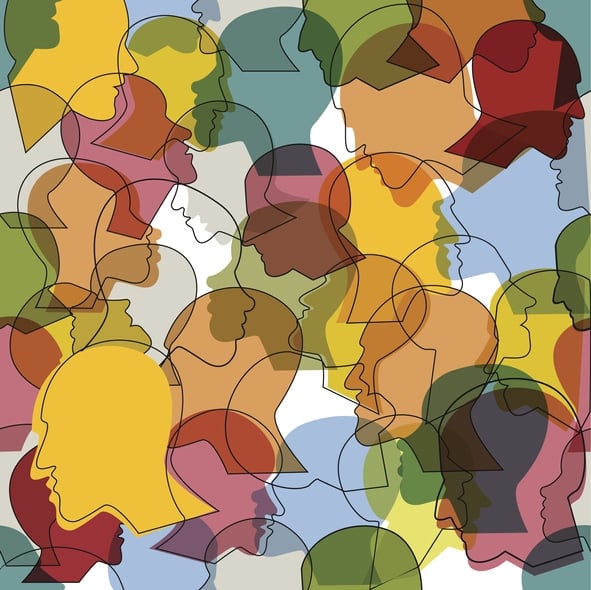You have /5 articles left.
Sign up for a free account or log in.

Istockphoto.com/kubkoo
My sophomore year of college, I joined the university choir. Over spring break that year, I traveled with the group for a weeklong tour in Germany. Relatively new to the group, I found myself in a foreign country with a double-decker tour bus full of people who really didn’t know too much about me.
At the end of the week, as was tradition, the student officers of the choir handed out special trip awards at the farewell dinner -- a bit like the senior superlatives doled out at the end of high school. Before my own high school graduation, I had been dubbed “Most Cynical” -- so imagine my surprise when the choir officers announced to the room that I had won the award for being the person who was the happiest and most cheerful throughout the trip: the “Prozac Award.”
At the time, I burst out laughing, which my fellow singers perhaps chalked up to my “cheery” disposition. But I was really laughing at a joke that no one else in the room was in on: I was, in fact, on Prozac, and had been dealing with debilitating depression for years. The irony was just too good.
Nearly a decade later, as a graduate student in sociology, the disconnect between how I seem (that is, happy), and my own reality (a decade-long, daily struggle with mental illness) persists. Unless I make a point of disclosing my mental illness to others, they are often none the wiser. But as time has passed, I’ve become less willing to hide what I view as an integral part of my identity. So now, in my third year of teaching undergrads, I make a point each semester of talking to my students about my struggles with anxiety and depression, as well as the perpetually underrated value of self-care. Initially apprehensive about such disclosure, I’ve found that the appreciative responses I get from students do no less than sustain me: perhaps predictably, I am extremely moved when even just one student pulls me aside to tell me how much my openness and honesty has meant to them, since they (or their sister or brother or girlfriend or boyfriend or mother or father …) also struggle with mental illness. Having this effect on students serves as a continuing source of strength for me when the demons of impostor syndrome and graduate school frustration launch their relentless attacks.
But regardless of their appreciation for my honesty, students’ reactions are often characterized by surprise: “I would have never guessed you had issues with anxiety!” “But you just seem to have it all together!” And my personal favorite: “You just seem too laid-back to have anxiety.”
As I’m sure my choir mates would have been years ago, my students today are confused by the seeming disconnect between my outward appearance and my inner reality. And this confusion points to our continued inability as a society to wrap our heads around the often invisible nature of mental illness.
This year’s headline deaths of Kate Spade and Anthony Bourdain have highlighted this confusion. Spade’s father said that she “sounded happy” the night before she ended her own life. Someone in the handbag industry said, “She was always just as happy and delightful as her collection was.” Bourdain may have had “a cynical sense of humor at times, [but] he generally seemed happy on the outside” to his public audience. Back when Robin Williams died by suicide in 2014, disbelief ran rampant as people struggled to reconcile his iconic comedic image with what was revealed to be his deep-set depression. Headlines around celebrity suicide deaths like these, as well as the reactions to them that people post on social media, keep hitting the same notes of confusion and surprise: “This person was so miserable! How did we not know!”
The persistent and increasingly recognized stigma around mental illness fuels the privatization of personal struggles. Our front-stage and backstage selves can look like entirely different people as we try to hide things like depression and anxiety, worried they would undercut the perception of our competence. Although mental health awareness and the fight against the stigmatization of mental illness and suicide have certainly made promising strides in the last couple decades, few people would deny that such stigmatization remains remarkably resilient in American culture.
And in academe -- a realm where the quality of your mind is precisely where your value is perceived to lie -- the need to hide mental illness may become even more intense than in other arenas of life. There is often an unspoken -- or spoken -- assumption that mental illness and an academic career don’t mix. One of my professors once asked me how I planned to pursue a life of teaching given my “ … issues.”
But that assumption is discriminatory, and it only functions to limit neurodiversity in academe -- both at the professorial and student levels. If we are suspicious of the capabilities of mentally ill faculty and educators, what does that imply for how we approach students with mental illness or learning disabilities?
For both my students and myself, I am committed to disclosing my struggles with mental health and openly advocating for the importance of self-care with each new semester that comes. I suppose I’ve reached a point as a sociologist where I cannot bear to teach my students about the social construction of stigmatization while simultaneously allowing myself to be silenced by that very phenomenon.
I am in no way advocating that everyone with mental illness in academe should disclose their struggles to their students and others. Power relations and privilege inevitably play a role in who is “allowed” to disclose without fear of consequence; consequences differ for educators with different social identities and professional positioning in the academic hierarchy. My own privilege as a cisgender heterosexual white person certainly lends me flexibility in being able to disclose my struggles with mental illness to students that educators of other identities may not have.
And certainly each person’s mental health, like their physical health, is first and foremost their own business -- and doesn’t need to be anyone else’s. It is ultimately, and importantly, each educator’s personal choice whether they disclose any struggles with mental illness to their students. Thus, my only aim here is to offer my own (admittedly limited) experience as evidence of the possibility for empowerment through such disclosure -- empowerment not only for oneself as an educator but also for one’s students. Students today face a punishing combination of, on the one hand, extreme pressure from increasingly competitive academic and postgraduate environments and, on the other, persistent mental health stigma that judges anyone who struggles in those environments.
So, in a culture and academic climate that reward and often require an unsustainable level of productivity and perfection, showing students the humanity of their teachers promises more than just the molding of a more inclusive academe. It has the power to teach students that neurodiversity and success are indeed compatible -- that struggling with mental health does not doom them to failure. And ultimately, disclosure has the potential to demonstrate that mental illness in no way attenuates their value as scholars and as human beings.




